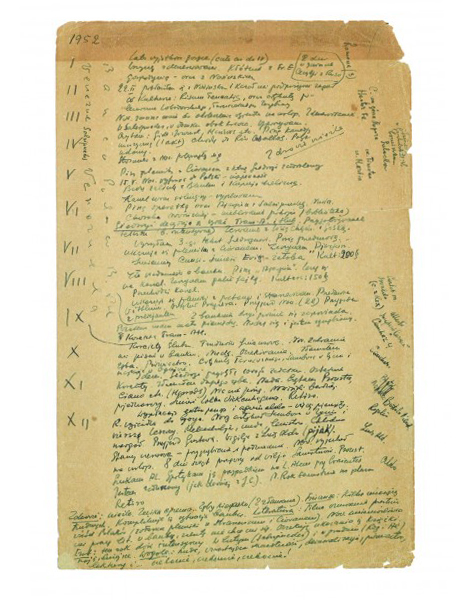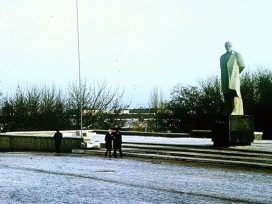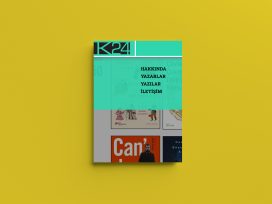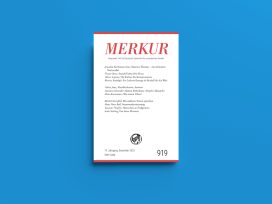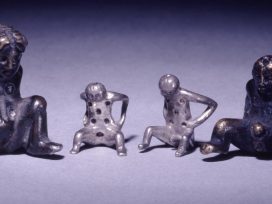Adam Puchejda: How would you describe Gombrowicz’s Kronos? Is it private, intimate, sublime, banal?
Jerzy Jarzebski: Ambivalent. It is private, personal and intimate, but at the same time it is none of these. Primarily, it is a record of facts that are not private as such. It contains the humdrumness of life. I met with this and that person, I drank another cup of coffee, I signed a contract with the publishing house, etc. Of course, in Kronos you can also find very personal fragments, the ones dealing with Gombrowicz’s sexual and emotional relationships, but throughout the text he tries to be strictly objective. This is a record that Gombrowicz writes for himself in order to read it again and again, trying to grasp a sense of his own life. If you think about it this way, you understand why this text strives to be at least an attempt to record an objective, factual truth. It becomes personal only when you start to interpret it – something that Gombrowicz does himself, even within the text.
AP: But how can you make any sense of this tangle of names, dates and events, a sort of raw record of almost all life’s events?
JJ: Gombrowicz was a metaphysician and, at various moments of his life, looked for a pattern in his own existence. When he sailed back from Argentina to Europe – we read in his Diary – he expected to see the “Chrobry” sailing in the opposite direction. The Chrobry was the name of the ship he took to Argentina in the first place, 24 years earlier. Seeing it again, in accordance with the vision that Gombrowicz entertains, would be a sign that the period of his life spent in Argentina has come to an end. Sometimes Gombrowicz – already in Kronos – is playing with numbers and it is very funny, because he is not able to add two and two. Wherever there are calculations, we find in them some horrendous mistakes, but it was on these erroneous calculations that Gombrowicz based his conclusions. The dates are also important to him, e.g. 15 and 22 February, when he was taken ill with flu and admitted to the clinic Hygiea in West Berlin. For him it was the beginning of the “Bersee” – as he called his personal catastrophe, which he celebrated every year. Bersee, for Gombrowicz, means the “Sea of Berlin”, the sea that swallowed him because, afterwards, he never returned to full strength.
AP: Does it mean that we can think of Kronos as a key to his life and work?
JJ: If you use the metaphor of an actual, physical key, then Kronos is a key made by someone who has a piece of metal or wire and who sits in front of the keyhole trying to open the door. We have in our hands this worn-out, very bent picklock or key and maybe it will open the door, maybe it won’t. It may be that we think it has actually unlocked the door but in fact it only turned in the lock and the door is still closed. We should not think of Kronos as a testimony similar to Gombrowicz’s Diary. The latter is a document of his thinking and evidence of his contribution to European and world thought during the twentieth century. Kronos is the record of his life, his fate, which forms the lining of his thinking. Kronos provides an account of Gombrowicz’s life at a given point in time, as he worked on given pieces in his oeuvre, such as – for instance – an important discourse on nature published on 1 January 1958 in his Diary. In this instance, there is a section in Kronos on the cow and the eucalyptus avenue that describes events, perhaps, a year earlier, in 1957, when Gombrowicz spent New Year’s Day at the estancia “La Cabaña”. But they do not appear in the Diary because, due to his quarrels with Jerzy Giedroyc (editor of Kultura, a leading Polish-émigré literary-political magazine in Paris, and the first publisher of Gombrowicz’s Diary) in the same year, Gombrowicz published only two episodes of his literary journal. Now, we can use Kronos in order to verify such things. What is more, maybe a doctor will look at a rich pharmacopoeia that Gombrowicz consumed and come to some interesting conclusions about the impact of hundreds of medications he was taking during the course of his creative process. We can imagine a variety of things but now we finally have the basic material that might prove helpful in relation to such considerations.
AP: Gombrowicz’s personal notes should therefore be considered only as a supplement to our knowledge of Gombrowicz’s work, a supplement that does not fundamentally change the reception of his literature?
JJ: That is correct. The publication of Kronos will probably not change anything in our reception of Gombrowicz’s work because this work is done, closed – it is as it is, and all of Gombrowicz’s own comments on his works have already been published too. Kronos as a record of life has a contextual significance. Of course, if we think of Gombrowicz as an important writer for Poles, a writer that at some point helped Poles change the way they think about themselves, then to know about all the events and experiences recorded in Kronos, in such a dry manner, is very important for us, because it complements our thinking in a significant way. There can be no doubt that Kronos is an original document, especially because Gombrowicz had an original, remarkable life. He lived very intensely, he changed his place of residence time and time again; he lived in four countries on two continents and led an extremely active social and intellectual life. Once Janusz Marganski wrote aptly about Gombrowicz that he was always a beginner – he endlessly started from the beginning. Reading Kronos, we find out what it means to start from scratch in the middle of one’s life. So – as some critics say – it is a form of bookkeeping, but not just bookkeeping in the received, narrow sense of the word. Kronos relates to the enterprise of life, and this is extremely important. In short, it is unique.
AP: However, in the era of ubiquitous exhibitionism, Gombrowicz’s Kronos may fall victim to all too easily made generalizations, or simple misunderstandings.
JJ: Certainly, there will be comments that will try to show Kronos as an attempt at self-exposure, but you have to be aware of the limitations of these types of judgments. In this document, there are no descriptions of sexual acts, no descriptions of intimacy, only dry statements of fact. From these records, we learn a lot, not only about the period, but about Gombrowicz himself. For example, we can now clearly define his sexual preferences – Gombrowicz had relations with both women and men (but keep in mind that Gombrowicz loved youths, regardless of whether they were male or female), that in these relations he treated women somewhat worse than men, and often used the word “whore”. Moreover, Gombrowicz does not spare women painful comments. He informs one of the girls that she has “stinky feet”, for example. He had a completely different attitude to boys. He treated them in an almost fatherly manner, provided for them, paid for their education. With Kronos we finally get lots of information on Gombrowicz’s health, especially during his last difficult years in Germany and France. For instance, there is an unpleasant scene in Vence when Gombrowicz already has serious trouble with his stomach, gets diarrhoea and dirties his pants. Nevertheless he writes about that in Kronos unceremoniously. Still I would not call this fragment exhibitionist, only an honest record of illness that is never aesthetically pleasing.
AP: But why the decision to publish Kronos now? Rita Gombrowicz acknowledges that she already knew of the existence of these records in the 1970s, but at that time she decided not to publish them.
JJ: This is a complex issue. Firstly, I believe that Rita has not made a decision on the issue for so long because it was too personal for her. In Kronos, the relations between her and Gombrowicz are not always presented in a fair and loyal way, they are not always pleasant on the part of Gombrowicz. She probably did not want everyone to know about it, to comment. But on the other hand – if the text was not published during her life, it is not clear what would have been done with a variety of brief observations noted by Gombrowicz, which would have been very hard to decipher. This was the last opportunity to ask people who lived during the time – that is, the post-war period because, unfortunately, the interwar period, the 1920s, is now impossible to describe in full detail. Rita also wanted to supervise this publication in some way: to comment on and check the facts was incredibly important to her. She has helped us a lot in this job, especially in deciphering who’s who during the period of Gombrowicz’s life in Vence and Royaumont. The third thing and, in the end, perhaps the most important one is the question of the reconstruction of Witold Gombrowicz’s biography, which could probably be done only by himself, even if he did make mistakes – yet they are easy to spot, as when he provides the wrong date for the first edition of Yvonne, Princess of Burgundy. I do not know whether Gombrowicz thought about such issues with regard to the release of Kronos. He has probably taken some into account, but for him, this text had a utilitarian function.
AP: However, you have also pointed out that this utilitarian function hides some deeper meanings. Józef Gombrowicz, a nephew of the writer, once mentioned that Witold’s choice of furniture in his French home reflected how he wanted unconsciously to return to his former life in Poland. Kronos would have played a comparable role to the choice of furniture.
JJ: That’s right, in Gombrowicz’s behaviour, the continuous storytelling, reading and re-reading of records of the past, and in the improvements and changes he made to these records, you can see an attempt to reconstruct the past. We might imagine that Gombrowicz, like other immigrants, such as Jan Lechon, also tried to return to the past in order to once again feel somehow rooted and stop being the eternal rookie who must every now and then start everything again. As a man who is constantly starting over, he is in fact looking for a place to put down roots, searching for the grounds that enable him to conclude that “there is a hand that shapes my life”. A sense of purpose emerges when we return to scenes from the past and reconstruct them in the full awareness of their importance and symbolic meaning. A period of life ends but at least a semblance of sense is constructed; in fact, even a vision like that of the Chrobry at sea becomes important.
Collaboration: Lukasz Pawlowski, Karolina Szymaniak

